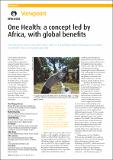| dc.contributor.author | Kamani, Titus | |
| dc.contributor.author | Kazwala, Rudovick | |
| dc.contributor.author | Mfinanga, Sayoki | |
| dc.contributor.author | Haydon, Dan | |
| dc.contributor.author | Keyyu, Julius | |
| dc.contributor.author | Lankester, Felix | |
| dc.contributor.author | Buza, Joram | |
| dc.date.accessioned | 2023-09-13T05:49:37Z | |
| dc.date.available | 2023-09-13T05:49:37Z | |
| dc.date.issued | 2015-05-09 | |
| dc.identifier.uri | https://doi.org/10.1136%2Fvr.h2461 | |
| dc.identifier.uri | https://dspace.nm-aist.ac.tz/handle/20.500.12479/1988 | |
| dc.description | This research article was published by BMJ Publishing Group in 2015 | en_US |
| dc.description.abstract | One Health evolved from
the recognition that an
interdisciplinary approach is
required to understand complex
health problems, and that
the health of humans and
animals are inextricably linked.
Through closer cooperation
between the human, veterinary
and environmental health
sectors, added value, in terms
of health metrics, cost savings
and environmental services
is achievable. Although the
One Health concept has been
recognised for many years,
particularly since the seminal
work of Calvin Schwabe
(Schwabe 1984), many
challenges remain in making it
operational. | en_US |
| dc.language.iso | en | en_US |
| dc.publisher | BMJ Publishing Group | en_US |
| dc.subject | Research Subject Categories::NATURAL SCIENCES | en_US |
| dc.title | One Health: a concept led by Africa, with global benefits | en_US |
| dc.type | Article | en_US |

